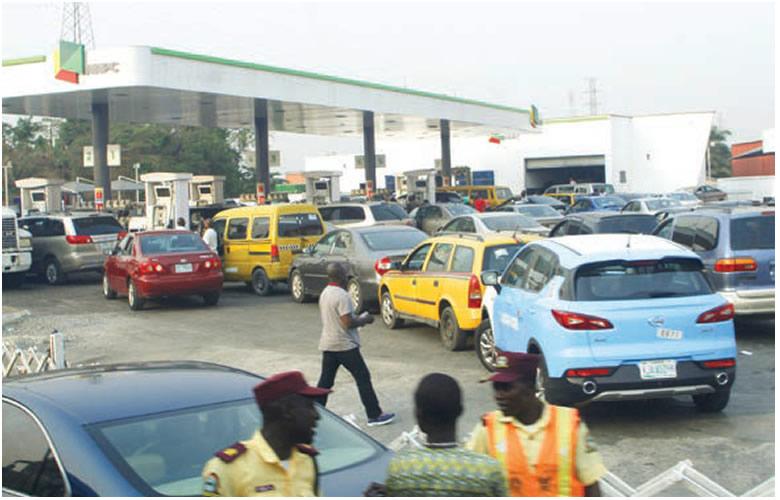… As Citizens spend 70% to 90% of Income on Essentials
In a series of interviews conducted by Housing TV Africa, Nigerians from various walks of life voiced their concerns about the recent hike in fuel prices and its far-reaching effects on housing, transportation, businesses, and the overall economy. Citizens now find themselves spending up to 70 to 90 percent of their income on necessities, leaving little room for savings or discretionary spending.
This increase in living costs has left many Nigerians struggling to make ends meet and lamenting that life has become increasingly difficult.
Speaking with Housing TV Africa, Honourable Josiah Daput, a former councillor from Plateau State, noted the direct impact of rising fuel prices on transportation, explaining that his daily commute costs have more than doubled. This increase has also led to higher rents, as landlords adjust to the overall cost of living, further exacerbating the challenges faced by ordinary citizens. “The money I used to spend commuting from Apo to the Federal Secretariat used to be ₦400. Now, it has skyrocketed to ₦1,000,” he lamented.

A businessman, Hon. Ikechukwu Emmanuel shared similar frustrations, pointing out that the fuel price hike has affected every sector, particularly housing. He emphasized that the poor are disproportionately affected, with landlords raising rents in response to soaring building material costs. “The poor are hit the hardest,” he said. “Landlords are increasing rents because the cost of building materials has gone up. Everything is connected.”
With the recent launch of Dangote’s refinery, some Nigerians are hopeful that the situation might improve, anticipating that it could help stabilize fuel prices. However, Daput remains cautious, suggesting that while the refinery might reduce prices slightly, the impact may be limited. “The refinery might ease the situation, but I expect the price of Dangote’s fuel to be around ₦500 to ₦600. It might break the NNPC’s monopoly, but we must wait and see,” he noted.
READ ALSO: Umahi summons Dangote, BUA, Lafarge, others over rising cement prices
Emmanuel echoed this sentiment, stating that if locally produced fuel from Dangote’s refinery becomes readily available, prices should decrease due to the elimination of import duties. However, he stressed the need for the government to revive existing refineries, such as those in Port Harcourt, Warri, and Kaduna, or lease them out to private operators to reduce the suffering of Nigerians.
Public servant Hassan Hamza also underscored the grim reality many Nigerians face. Hamza also described the fuel price hike as surprising and painful. “Everybody was expecting the price of PMS to come down, but instead, it increased by 40-50%,” he said.
“Housing is a basic necessity, yet landlords are forced to increase rents to cope with the rising cost of living. Nigerians spend more than 70% of their income on essentials, and saving has become impossible,” Hamza also noted. He also mentioned the rising cost of goods and services, from soft drinks to household items, and predicted further increases in housing costs.
A pastor from Plateau state also echoed these concerns, explaining that the economy is tightly linked to fuel prices, creating a vicious cycle where increases in fuel costs lead to higher rents and food prices. He noted that the average Nigerian now spends close to 90% of their income just to survive.
Also, a student leader, serving as the National Director of Research and Innovation for the National Association of Nigerian Students, Comrade Sadiq Zango, highlighted the impact of the fuel price hike on students. He noted that students are struggling to pay for accommodation and transportation, leading to widespread anger and frustration urging the government to consider the plight of students before the situation escalates into protests.
READ ALSO: High Cost Of Building Materials In Nigeria And How It Affect Property Development
The student leader also expressed concerns that students are increasingly focused on survival rather than education due to the ongoing crisis. He called for a reduction in fuel prices and urged the government to expedite the release of Dangote’s refinery fuel to the market. “This refinery that we have been hearing about should give Dangote the opportunity to start selling at a lower price,” he said, expressing hope that this would help stabilize the economy and relieve some of the pressure on students.
He also shared that people are no longer going to work regularly due to the fuel hike, leading to inconsistencies in daily activities and a lack of food. Zango highlighted the widespread challenges facing the country and urged the government to consider the plight of the masses and implement policies that would bring about positive change.
Ogundele Toke, a civil servant, expressed similar frustrations, stating that the increase in fuel prices has led to significant financial strain, particularly in housing and transportation costs. “For example, my house rent used to be 200,000 Naira. All of a sudden, my landlord just increased it to 350,000 Naira just two weeks ago. And how much is my salary as a civil servant?,” Toke shared.
Ogundele continued to describe the difficulties faced in the market, where the prices of goods have also skyrocketed. “Whatever you used to buy is different from now,” he said, adding that even the cost of school fees for his children has increased significantly.
Another respondent pointed out that Nigerians are now spending over 70% of their income on food and transportation, with the cost of living steadily rising. “If you are going somewhere, you used to spend 100 Naira before, now it’s 300 Naira,” the respondent explained, emphasizing the impact on daily life.
A widow who cried while sharing her personal struggles, said she tries to provide for her two boys while dealing with the frustrations of applying for government jobs. She described the challenges of surviving on a limited income in a difficult economy, expressing deep frustration with the system that seems to favour those with connections over those in genuine need.
The business community is equally disheartened. John, a businessman, expressed disappointment in the government’s handling of the situation, noting that promises of lower fuel prices have not materialized. He warned that if the situation is not addressed soon, nationwide protests could occur.
The housing market in Abuja has also become increasingly unaffordable as another businessman, Afolabi, expressed concern about the high cost of accommodation in Abuja. “I’m paying ₦700,000 for a one-bedroom apartment in a village behind Shoprite, and now my landlord wants to increase it to ₦1 million. The cost of living in Abuja is outrageous,” he said.
He also criticized the government’s inability to regulate the housing market, adding that if Dangote’s refinery doesn’t provide relief, housing and other essentials will continue to spiral out of control.
The overwhelming consensus from these interviews is that the recent fuel price hike has severely impacted every aspect of life in Nigeria. Nigerians are calling on the government to take immediate and decisive action to mitigate the effects of the fuel price hike, alleviate the suffering and stabilize the economy before the situation worsens.



